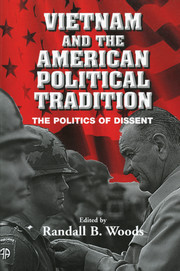Book contents
- Frontmatter
- Contents
- List of Contributors
- Introduction
- Anti-Imperialism in U.S. Foreign Relations
- World War II, Congress, and the Roots of Postwar American Foreign Policy
- The Progressive Dissent: Ernest Gruening and Vietnam
- “Come Home, America”: The Story of George McGovern
- Congress Must Draw the Line: Senator Frank Church and the Opposition to the Vietnam War and the Imperial Presidency
- Dixie's Dove: J. William Fulbright, the Vietnam War, and the American South
- Advice and Dissent: Mike Mansfield and the Vietnam War
- The Reluctant “Volunteer”: The Origins of Senator Albert A. Gore's Opposition to the Vietnam War
- A Delicate Balance: John Sherman Cooper and the Republican Opposition to the Vietnam War
- Friendly Fire: Lyndon Johnson and the Challenge to Containment
- Richard Nixon, Congress, and the War in Vietnam, 1969–1974
- Index
World War II, Congress, and the Roots of Postwar American Foreign Policy
Published online by Cambridge University Press: 21 November 2009
- Frontmatter
- Contents
- List of Contributors
- Introduction
- Anti-Imperialism in U.S. Foreign Relations
- World War II, Congress, and the Roots of Postwar American Foreign Policy
- The Progressive Dissent: Ernest Gruening and Vietnam
- “Come Home, America”: The Story of George McGovern
- Congress Must Draw the Line: Senator Frank Church and the Opposition to the Vietnam War and the Imperial Presidency
- Dixie's Dove: J. William Fulbright, the Vietnam War, and the American South
- Advice and Dissent: Mike Mansfield and the Vietnam War
- The Reluctant “Volunteer”: The Origins of Senator Albert A. Gore's Opposition to the Vietnam War
- A Delicate Balance: John Sherman Cooper and the Republican Opposition to the Vietnam War
- Friendly Fire: Lyndon Johnson and the Challenge to Containment
- Richard Nixon, Congress, and the War in Vietnam, 1969–1974
- Index
Summary
In America's Longest War and subsequent works, historian George Herring has argued that the assumptions that underlay America's decision to wage cold war against the Soviet Union and its allies – namely, the Domino Theory, the Munich analogy, and the notion of a monolithic communist threat – were responsible for U.S. involvement in the Second Indochinese War. He is certainly correct, but the argument can be taken further. At the close of World War II, diplomats and politicians struggled to devise a strategy for confronting and containing the forces of international communism that fit in with traditional foreign policy philosophies and approaches. Given that the three basic themes of twentieth century diplomacy – isolationism, unilateralism, and internationalism – seemed mutually exclusive and that American foreign policy was traditionally as much or more a function of domestic politics and culture as events in the international arena, the task was daunting. Indeed, if America was to present the communist monolith with a noncommunist monolith of sufficient strength and unity, isolationism, unilateralism, and internationalism would have to be modified and harnessed together in support of the cold war. That is precisely what happened; appropriately enough for a nation with a republican form of government, the articulation and reconciliation of cold war imperatives with traditional approaches to foreign affairs took place in the Congress of the United States.
Foreign affairs were, not surprisingly, much on the minds of the United States Congress, particularly the Senate, as World War II drew to a close.
- Type
- Chapter
- Information
- Vietnam and the American Political TraditionThe Politics of Dissent, pp. 42 - 57Publisher: Cambridge University PressPrint publication year: 2003
- 1
- Cited by



